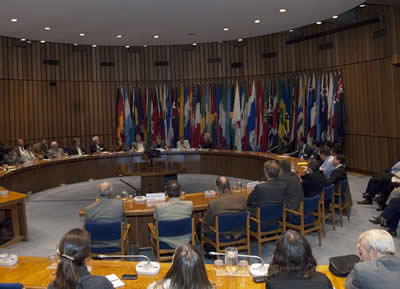ECLAC Discussions of Thought, Life and Times of Raúl Prebisch
Alicia Bárcena, Executive Secretary of ECLAC, presented the book The Life and Times of Raúl Prebisch 1901-1986, by the researcher Edgar J. Dosman.

(13 April 2011) "The region's inadequate productive and export diversity, as posited by Prebisch in the middle of the last century, remains one of the main ongoing issues for Latin America" - these were the words of Alicia Bárcena, Executive Secretary of the Economic Commission for Latin America and the Caribbean (ECLAC), as she presented the book The Life and Times of Raúl Prebisch, 1901-1986 by Canadian academic Edgar J. Dosman on Wednesday.
The work by Dosman, who is a researcher and professor of international relations at York University in Toronto, Canada, describes the life and legacy of Raúl Prebisch, an Argentine economist who was Executive Secretary of ECLAC between 1950 and 1963, and who is considered one of the founders of this United Nations regional commission.
"ECLAC thinking is being renewed on the basis of what Prebisch wrote in his life and times. We are taking up his approach, that is now known as neo-structuralist, which connects his original thinking with the new era of international openness and globalization. Prebisch used new concepts to seek out historical moments", stated Bárcena.
According to Bárcena, the document "Time for equality: closing gaps, opening trails", presented by ECLAC last year, is a roadmap for the region's countries and largely reproduces the legacy of Prebisch the Argentine economist.
"There was an unjustified biographical vacuum about the life of Prebisch, but this has been properly filled by this book", said Ms. Bárcena at a ceremony attended by the Canadian Ambassador in Chile, Sarah Fountain-Smith, the former ECLAC Executive Secretary, José Antonio Ocampo and Chair of the Editorial Board of the CEPAL Review, Osvaldo Sunkel.
The biography was published in 2009, and was voted "book of the year" by The Economist. The Spanish version was first launched in Madrid in May 2010, while the Portuguese version will be launched in São Paulo and Rio de Janeiro in August this year.
"Many of his ideas were seen as radical half a century ago, but are now accepted as common sense, both by his followers and his detractors. Who now questions the importance of regional integration, the need to reform global multilateralism, the smart State or the need to civilize globalization?", states Dosman, who also recognizes that many of the specific policies he promoted at the time would not be applicable today.
The author stated that "just before his death, Prebisch wrote ‘we must seek a new rationality that is not based solely on economic and social objectives, but also on fundamentally ethical objectives'".
According to Sunkel: "As stated in one of the chapters of the book, when Prebisch arrives in ECLAC, he ‘invents' Latin America, creates the previously non-existent notion of Latin America and gives it meaning, an image and a message".
Raúl Prebisch was born in the Argentine city of San Miguel de Tucumán in 1901, studied economics at the University of Buenos Aires, where he then became professor of political economy, before going on to work as a civil servant. He was a founder and the first Director of the Central Bank of Argentina.
After running ECLAC, he became Secretary-General of the United Nations Conference on Trade and Development (UNCTAD). In 1984, he returned to Argentina to work with the democratic government that took office in 1983. He died in Santiago, Chile, in April 1986.
Dosman is a founder of the Canadian Foundation for the Americas (FOCAL) and Director of the Canadian Council for the Americas. In 2002, he received the Order of Rio Branco from the Brazilian Ministry of Foreign Relations, for his contribution to the strengthening of Brazilian-Canadian relations in the sphere of academia and culture.
Any queries should be addressed to the ECLAC Public Information and Web Services Section.
E-mail: dpisantiago@cepal.org; telephone: (56 2) 210 2040/2149.
Contact
Public Information Unit
- prensa@cepal.org
- (56 2) 2210 2040